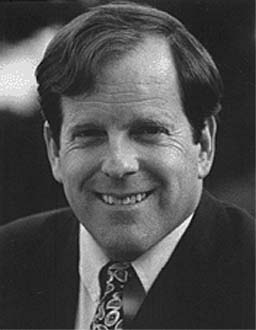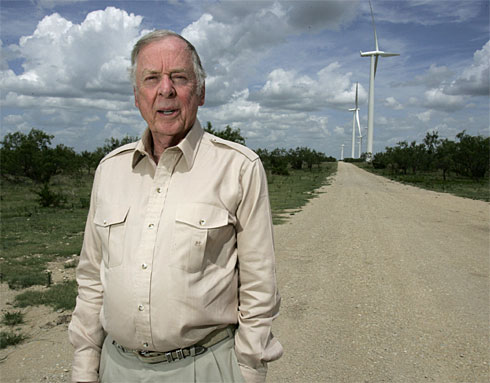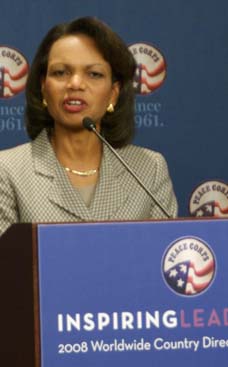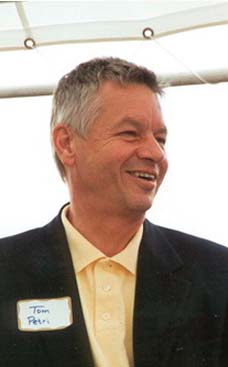
"I will be in the front row of the chorus cheering" him on, says Carl Pope, its executive director, who flew with Pickens to Sweetwater. Pope sees wind and solar energy as inexpensive sources of power that, along with other non-carbon forms, can be pooled to greatly reduce the need for oil- and coal-fired electric-generating plants. "When it's cloudy in Dallas and the wind's not blowing in Sweetwater, but the sun's blazing in the (Western) deserts, solar energy can run all those air conditioners in Dallas. When it's windy in Sweetwater and cloudy in the desert, wind energy from Sweetwater can heat homes in Chicago. "Mr. Pickens and I probably don't see eye-to-eye on some other matters," Pope concedes. "But he's right on this one." Washington's role, Pope said, should be in setting the goal and clearing roadblocks such as the patchwork of state, regional and federal regulations that block the creation of a true national grid that can shift electricity from anywhere in the country to anywhere that it's needed. Sierra Club President Carl Pope served as a Peace Corps Volunteer in India in the 1960's.
Carl Pope supports the Pickens Plan
Texas oilman T. Boone Pickens wants to supplant oil with wind
By Dan Reed, USA TODAY
SWEETWATER, Texas — Get ready, America, T. Boone Pickens is coming to your living room.
The legendary Texas oilman, corporate raider, shareholder-rights crusader, philanthropist and deep-pocketed moneyman for conservative politicians and causes, wants to drive the USA's political and economic agenda.
"We're paying $700 billion a year for foreign oil. It's breaking us as a nation, and I want to elevate that question to the presidential debate, to make it the No. 1 issue of the campaign this year," Pickens says.

Today, Pickens will take the wraps off what he's calling the Pickens Plan for cutting the USA's demand for foreign oil by more than a third in less than a decade. To promote it, he is bankrolling what his aides say will be the biggest public policy ad campaign ever. The website, pickensplan.com, goes live today.
Jay Rosser, Pickens' ever-present public relations man, promises that Pickens' face will be seen on Americans' televisions this fall almost as frequently as John McCain's and Barack Obama's.
"Neither presidential candidate is talking about solving the oil problem. So we're going to make 'em talk about it," Pickens says.
"Nixon said in 1970 that we were importing 20% of our oil and that by 1980 it would be 0%. That didn't happen," Pickens says. "It went to 42% in 1991 with the Gulf War. It's just under 70% now. Where do you think we're going to be in 10 years when our economy is busted and we're importing 80% of our oil?"
Finding solutions to other major issues, including health care, are important, he concedes. But "If you don't solve the energy problem, it's going to break us before we even get to solving health care and some of these other important issues." And it has to be done with the same sense of urgency that President Eisenhower had when he pushed the rapid development of the interstate highway system during the Cold War.
Of course, Pickens also has a particular solution in mind.
Wind. And natural gas.
Last week, Pickens loaded up his $60 million, top-of-the-line Gulfstream G550 corporate jet with reporters and a few associates from his Dallas-based BP Capital energy hedge fund and related companies and flew here to illustrate just how big — and achievable — his vision is.
There's not much to Sweetwater except for wild grasses, scraggy mesquite trees and rattlesnakes (Sweetwater hosts its famous Rattlesnake Roundup each spring). The gently rolling terrain and vegetation make it ideal for raising cattle, which is what its first settlers did in the 19th century, and what their descendants do today. A regional oil boom in the 1950s and 1960s poured money into the area's economy, as have two oil revivals since: one in the 1980s and one now.
But the exciting new industry in town is wind energy. You can drive for 150 miles along Interstate 20 and never be out of sight of a giant wind turbine, claims Sweetwater Mayor Greg Wortham, who does double duty as executive director of the West Texas Wind Energy Consortium.
Were it a country all by itself, Nolan County, Texas, would rank sixth on the list of wind-energy-producing nations, says Wortham. Year-round wind conditions, the terrain, low land prices and a small population make it an ideal location for wind farms. It already produces more wind-generated electricity in a year than all of California. And the business is growing so fast that he struggles to define it by numbers. By year's end, there'll be more than 1,500 turbines in Nolan County, representing a $5 billion investment. In the multicounty Rolling Plains region, there are already 2,000 operating turbines.
Add those operating further west, the Permian Basin region around Midland and Odessa, and the entire area has more than 3,000 turbines operating, producing about 6,000 megawatts of electricity — about equal to the power produced by two to three nuclear power plants.
Growth potential
The growth potential is, well, electrifying.
New turbine towers are going up at a rate of three to four a day in the Sweetwater area, Wortham says. "It depends on the (Texas) Public Utility Commission, but the number could be 20,000 ultimately," Wortham says.
Pickens, who over the past two years has become the USA's biggest wind-power booster, is quick to note that "there could be lots of Sweetwaters out there," especially in the nation's midsection, where winds are ideal for power generation.
Indeed, though Sweetwater is a windy place, plenty of locations farther north in the Great Plains are even better suited to wind farming. One is about 250 miles north of Sweetwater, near Pampa, northeast of Amarillo in the Texas Panhandle. That's where Pickens is building what would be the world's largest wind farm, four times larger than the current titleholder near here. So far, he has spent $2 billion on the project, including a record purchase of nearly 700 wind turbines this year from General Electric. He expects to spend up to $10 billion on the project and to begin generating electricity in 2011.
Though Pickens doesn't own a single wind turbine in the Sweetwater area, Wortham was eager to play host to the oil baron and the reporters traveling with him. Sweetwater, he says, is proof that wind power has much more potential than its many skeptics believe.
"People hear about the 8-foot-tall wind turbines at Logan airport in Boston or the five turbines at Atlantic City and think 'interesting,' " Wortham says. "But they don't see how we can get to the 300,000-megawatt-production level" established by the Bush administration as a national goal for 2030. "Once you come to Sweetwater, you see that it can be done, and be done pretty easily, not only here, but … anywhere there are prime wind conditions. None of this existed seven years ago. Now, we produce enough electricity in this one county to power a large city, and we do it cheaply and cleanly."
Getting lots more electricity with wind is only half of the Pickens Plan. Increasing wind-power production by itself won't reduce U.S. dependence on foreign oil because most of that oil is consumed as gasoline.
The key, Pickens says, is that wind energy can be used as a substitute for natural gas now burned to generate electricity. That, in turn, will make far more natural gas available for use as a transportation fuel. Pickens' plan is to produce enough wind power within 10 years to divert 20% of the natural gas now used to fuel power plants for use in cars and trucks. That's much more aggressive a growth plan for the development of wind energy than envisioned by the Department of Energy, which doesn't expect the USA to be getting 20% of its total energy needs from wind until at least 2030.
Pickens foresees as many as a third of the vehicles running on natural gas within only a few years. Julius Pretterebner, director of the Global Oil Group at Cambridge Energy Research Associates, says getting 15% to 20% of the USA's cars to run on natural gas — in some cases, in mixtures with other fuels in dual-fuel vehicles — by 2020 would be an outstanding achievement, and doing that will require federal support to expand the necessary infrastructure.
Powering vehicles with compressed or liquefied natural gas, CNG or LNG, has been Pickens' pet project since the late 1980s.Yet the concept has been very slow to catch on.
Distribution is a major problem. CNG drivers can, like Pickens, install inexpensive equipment to fill up at their homes. But with fewer than 800 natural gas filling stations around the USA, drivers can't count on being able to fill up wherever they go. So, for the most part, CNG, or LNG, has remained limited to fleet operators, such as local bus companies or big-city police departments.
And that's where David Friedman, research director in the vehicles program at the Union of Concerned Scientists, says most natural-gas-powered vehicles will continue to be operated because of the distribution problem, the lack of vehicles made specifically to run on CNG, and the cost of converting conventional vehicles to run on CNG.
"I honestly think (natural gas') role will be in medium- to heavy-duty vehicles and fleets — and as a stepping stone to hydrogen fuel-cell-powered vehicles in the future," Friedman says. Only one car, a version of the Honda Civic, is available from the factory ready for CNG fuel, he says, and only at a significant premium over the price of a conventionally fueled version.
If you build it …
Pickens aims to shout down the skeptics by taking his case to the people via his TV ad campaign. If the nation is to break its addiction to foreign oil, a network of CNG stations could be built along interstates and in major cities for a relatively small investment, he says. Some gasoline retailers have told him they would add CNG pumps to their stations once they're certain there'll be enough vehicles capable of running on natural gas to justify costs.
Washington, Pickens adds, can encourage the move to natural-gas-powered vehicles by providing modest economic incentives for fuel retailers to invest in CNG pumps at their stations, for automakers to build CNG-powered cars and for individuals to convert their existing vehicles to CNG use. And it should continue to provide tax incentives for another 10 years to encourage wind energy's rapid development as part of an overall plan to wean the nation from foreign oil, he says.
"It certainly would be cheaper than what they're doing already for nuclear," Pickens adds. But he's also in favor of developing more nuclear energy, and every form of alternative energy to reduce oil imports. "Try everything. Do everything. Nuclear. Biomass. Coal. Solar. You name it. I support them all," he says. "But there's only one energy source that can dramatically reduce the amount of oil we have to import each year, and that's (natural) gas."
Pickens is an outspoken believer in the so-called peak oil theory that holds that maximum world production has peaked at about 85 million barrels a day — vs. current demand of about 86 million barrels a day — and will never rise much above that even with lots of new drilling and production.
"Even people who continue driving gasoline-powered cars and trucks will benefit" from his plan, he says.
Critics could easily accuse Pickens of advocating a major new public policy initiative that will line his own pockets. He is, after all, a big player in both the wind power and natural gas businesses. Pickens says while his hedge fund will earn money for its investors, earning more money personally is meaningless: "I'm 80 years old and have $4 billion. I don't need any more money."
He's more concerned that his efforts to make reducing foreign oil dependency the No. 1 issue on the national agenda will be dismissed by the public and, therefore, by Washington. So he says he's carefully steering his plan clear of partisan bickering.
He's already enlisted an unlikely supporter: the Sierra Club. "I will be in the front row of the chorus cheering" him on, says Carl Pope, its executive director, who flew with Pickens to Sweetwater.
Pope sees wind and solar energy as inexpensive sources of power that, along with other non-carbon forms, can be pooled to greatly reduce the need for oil- and coal-fired electric-generating plants.
"When it's cloudy in Dallas and the wind's not blowing in Sweetwater, but the sun's blazing in the (Western) deserts, solar energy can run all those air conditioners in Dallas. When it's windy in Sweetwater and cloudy in the desert, wind energy from Sweetwater can heat homes in Chicago.
"Mr. Pickens and I probably don't see eye-to-eye on some other matters," Pope concedes. "But he's right on this one."
Setting goals, clearing roadblocks
Washington's role, Pope said, should be in setting the goal and clearing roadblocks such as the patchwork of state, regional and federal regulations that block the creation of a true national grid that can shift electricity from anywhere in the country to anywhere that it's needed.
Getting support from groups and people not ordinarily aligned with his conservative political views is important to Pickens. A lifelong Republican, he'll vote for McCain. But he's not involved with McCain's campaign, largely to keep his plan from being dismissed as mere campaign rhetoric.
"This has to be a bipartisan effort," says the man who four years ago offered $1 million to anyone who could disprove the charges made against Democrat nomine Sen. John Kerry by the Swift Boat Veterans for Truth.
"This is not about Republicans vs. Democrats," Pickens says. "This is about saving our country from the ruination of spending $700 billion a year on oil imports. Ninety days after the oil hits our shores, it's all burned up, and we've got nothing to show for it. But they (foreign oil producers) still have our money. It's killing our economy."









